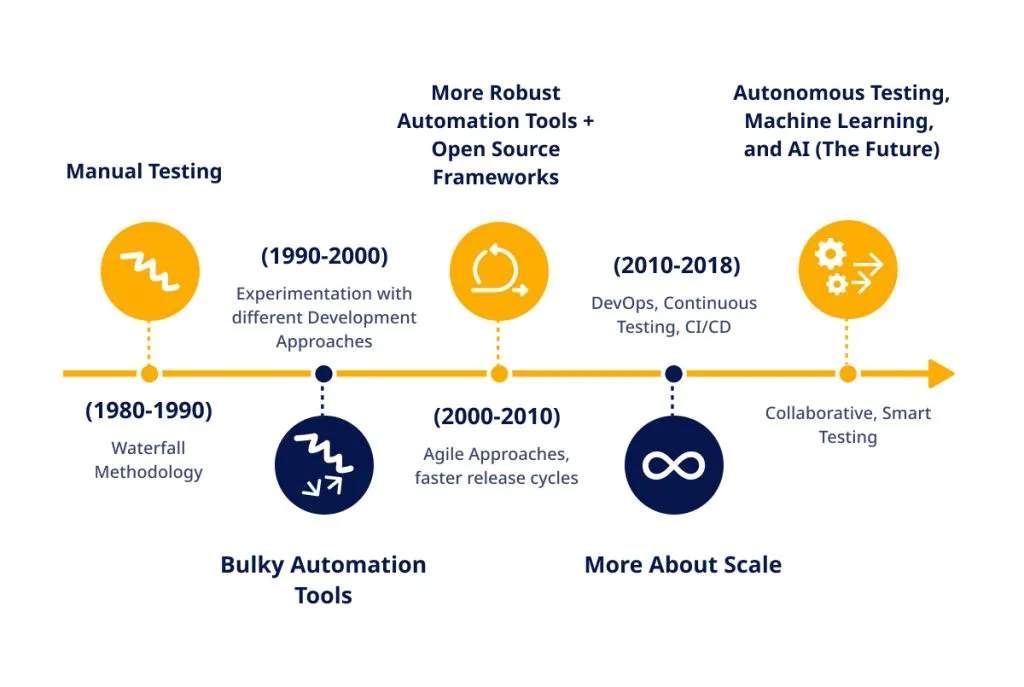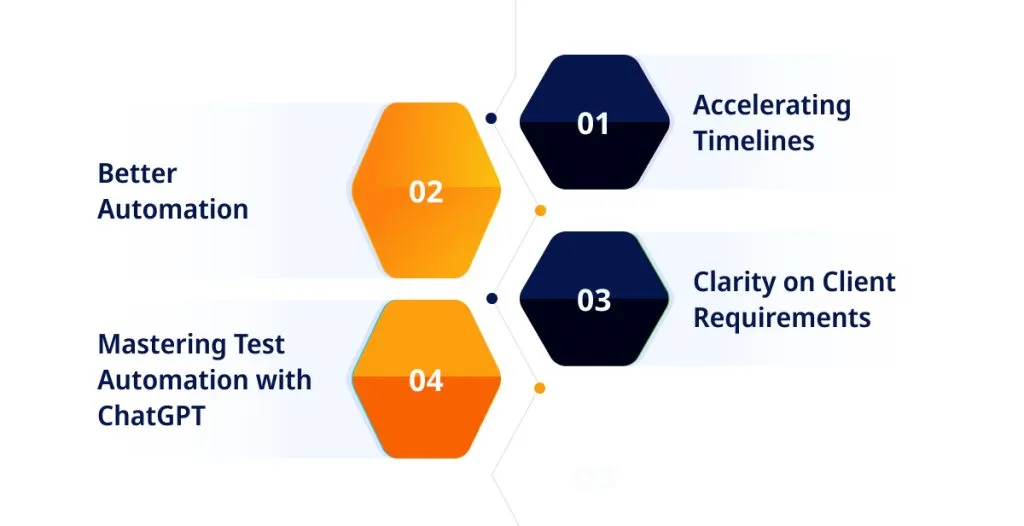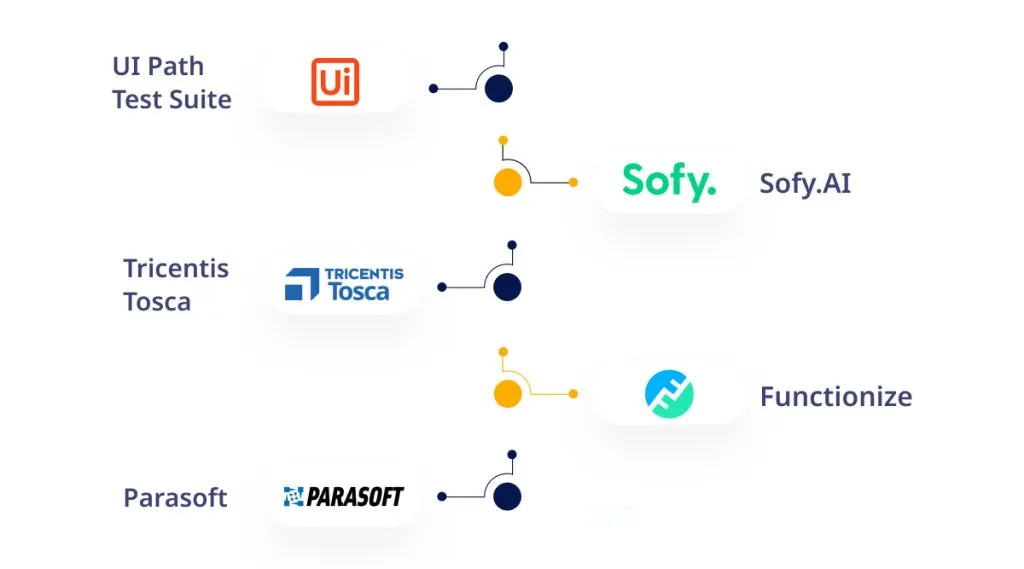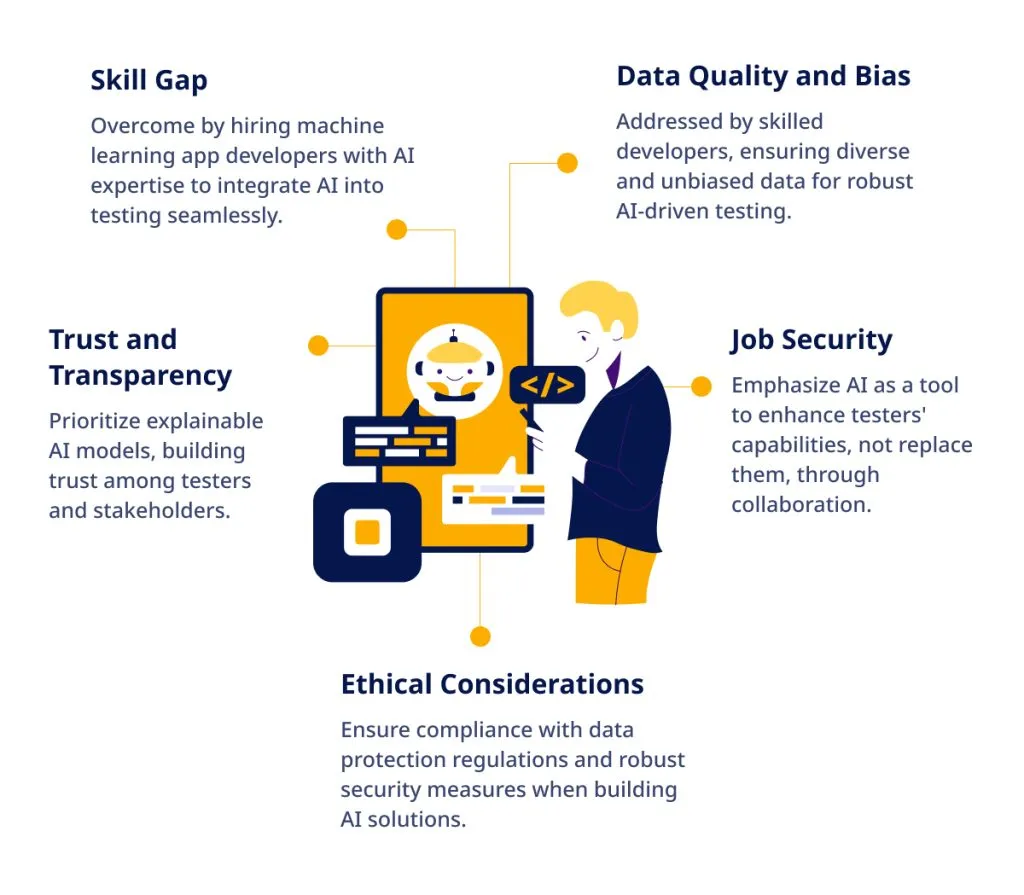Manual software testing can be time-consuming, error-prone, and costly, hindering development.
This is why businesses are now embracing the revolutionary power of AI in software testing. It is changing the game forever, boosting accuracy, efficiency, and cost-effectiveness.
This blog post explores how AI-driven test automation, defect detection, and test planning reshape the industry. Say goodbye to mundane testing tasks and unlock your team’s true potential with the seamless integration of Artificial Intelligence in software development.
Let’s dive into the future of software testing together!
Understanding AI in Software Testing
AI in software testing marks a paradigm shift in quality assurance. Unlike traditional testing approaches, which rely heavily on human intervention, AI leverages machine learning algorithms and data analysis to optimize the testing process.
By learning from historical test data, AI can efficiently identify patterns, predict defects, and prioritize test cases. It empowers testers to focus on more strategic tasks while AI handles repetitive and time-consuming tests.
Embracing AI in software testing means enhanced accuracy, faster feedback, and reduced testing costs. As the industry embraces this transformative technology, businesses gain a competitive edge by delivering robust, error-free software products to their customers.
Evolution of Testing
Testing has witnessed a remarkable journey, aligning with software development methodologies and technological advancements.
Manual Testing (1980-1990) – Waterfall Methodology
During the early stages of software testing, manual testing dominated the landscape. Testers executed test cases manually to validate software functionality. The Waterfall methodology provided a structured approach with sequential development phases.
Bulky Automation Tools (1990-2000) – Experimentation with different Development Approaches
With the rising complexity of software, the need for faster and more efficient testing methods also increased. The emergence of test automation led to the development of bulky automation tools. Teams began experimenting with different development methodologies. This era saw the dawn of the Agile Manifesto, which emphasized collaboration, adaptability, and iterative development.
More Robust Automation Tools + Open Source Frameworks (2000-2010) – Agile Approaches, faster release cycles
With the start of the new millennium, testing tools became more sophisticated and adaptable. Agile methodologies gained popularity, promoting iterative development and faster release cycles. Open-source testing frameworks like Selenium gained traction, empowering testers to create powerful automated test suites. Collaboration between development and testing teams improved, enhancing the overall product quality.
More About Scale (2010-2018) – DevOps, Continuous Testing, CI/CD
The focus shifted to scalability, efficiency, and continuous integration & delivery (CI/CD) practices. DevOps culture emerged, bridging the gap between development and operations teams. Continuous Testing became a critical component of the development pipeline, ensuring fast feedback and rapid bug detection. Automated testing was pivotal in enabling continuous delivery, allowing organizations to release software updates frequently and reliably.
Discover how AI is transforming the landscape of software testing
Autonomous Testing, Machine Learning, and AI (The Future) – Collaborative, Smart Testing
As we head into the future of AI in software testing, the evolution of testing embraces Autonomous Testing, Machine Learning, and Artificial Intelligence. Testing is becoming more collaborative, with AI-powered tools working hand-in-hand with human testers.
AI-driven testing can analyze vast amounts of data, predict potential defects, and autonomously optimize test cases. This smart testing approach ensures improved accuracy, quicker test cycles, and enhanced software quality, setting the stage for a more efficient and reliable software development era.
The testing evolution reflects the dynamic relationship between testing practices and software development methodologies. From manual testing in the Waterfall era to smart, collaborative testing powered by artificial intelligence in software development, each stage has shaped how we ensure software quality and deliver exceptional products to users.
How can AI optimize Testing?
AI in software testing is revolutionizing the testing landscape, unlocking new possibilities for optimizing various aspects of the testing process.
Accelerating Timelines
Testing timelines can be significantly reduced with AI’s capabilities to analyze vast datasets and predict potential issues. AI-driven tools can identify high-risk areas and prioritize test cases, enabling testers to focus on critical aspects first. This not only speeds up the testing process but also ensures that crucial defects are detected early, saving time and resources in the long run.
Better Automation
AI’s machine learning algorithms empower test automation to reach new heights of efficiency and accuracy. AI-driven testing tools can learn from historical test data and continuously improve test coverage, leading to more robust automated testing suites. As a result, testers can devote their expertise to more complex scenarios, while mundane and repetitive tests are seamlessly handled by AI automation.
Clarity on Client Requirements
An Artificial Intelligence app development company can assist in comprehending and refining client requirements. By analyzing past project data and customer feedback, AI systems can offer valuable insights into potential ambiguities or contradictions in requirements. This level of clarity helps teams deliver software that precisely aligns with client expectations, reducing rework and enhancing customer satisfaction.
Mastering Test Automation with ChatGPT
AI-powered chatbots like ChatGPT can become valuable assets in mastering test automation. Testers can interact with these conversational AI agents to quickly access relevant testing information, get code snippets for automation, or even troubleshoot automation-related challenges. Such assistance streamlines the learning curve for test automation, making it more accessible and efficient for testers of varying expertise levels.
Embracing AI in software testing, including integration testing, promises a future where software quality is optimized, development timelines are expedited, and customer satisfaction soars to new heights.
Also Read: What Is The Role Of Artificial Intelligence In The Financial Sector?
AI-Driven Test Automation
AI-driven test automation has emerged as a game-changer in the software testing realm, revolutionizing how organizations ensure product quality. Test automation has reached new heights of efficiency, accuracy, and adaptability, leveraging the power of artificial intelligence and quality assurance development company.
AI-driven testing tools can analyze vast amounts of data, predict potential issues, and optimize test cases autonomously. This not only accelerates the testing process but also improves test coverage and detects critical defects early on, reducing development costs and time-to-market.
Top 5 Popular AI-Powered Tools for Test Automation:
-
UI Path Test Suite
UI Path Test Suite is a robust and intuitive platform that employs AI capabilities for seamless test automation. With advanced image and text recognition algorithms, it can efficiently handle both desktop and web applications, making it a top choice for organizations seeking end-to-end automation solutions.
-
Sofy.AI
Sofy.AI is an AI-driven testing platform designed to simplify test automation. Its autonomous testing engine uses machine learning to automatically create and maintain test scripts, enabling testers to focus on more critical aspects of testing. The platform supports continuous testing across various devices and browsers, making it ideal for agile and DevOps environments.
-
Tricentis Tosca
Tricentis Tosca is a comprehensive test automation tool that integrates Artificial Intelligence in software development for intelligent test case design and optimization. Using AI-powered risk-based testing, it assesses the application’s vulnerability and prioritizes tests accordingly. The tool’s scriptless automation approach allows for faster test creation and maintenance.
-
Functionize
It is an AI-driven testing platform that employs machine learning to enable self-healing tests. It automatically identifies and repairs broken test scripts, reducing the need for manual intervention. The platform’s AI engine also helps in dynamic test data generation, enhancing test coverage and accuracy.
-
Parasoft
Parasoft offers AI-driven software and appplication testing solutions that cater to various testing needs, including functional, performance, and security testing. The platform uses machine learning to generate test cases, identify critical defects, and optimize test execution. Parasoft’s AI capabilities contribute to better code analysis and continuous testing practices.
See how AI can elevate your quality assurance to new heights
AI-Based Defect Detection
AI-based defect detection is revolutionizing the way organizations ensure software quality. When you partner with a quality assurance development company, they harness the power of machine learning algorithms for defect detection to offer more accurate, efficient, and proactive solutions.
Traditional defect detection methods often rely on manual inspection and testing, which can be time-consuming and prone to human error. However, the process is automated with AI-based defect detection, allowing for precision analysis of large datasets and complex code structures.
AI-powered tools can learn from historical defect data, enabling them to identify patterns and anomalies that might otherwise be missed. This helps predict potential defects early in the development process, reducing the overall cost of fixing issues and speeding up time-to-market.
When you hire machine learning app developers, it is crucial for businesses to implement AI-based defect detection with expertise in building and deploying such solutions. These skilled developers can create custom defect detection models that align with specific project requirements.
When you hire quality assurance developers, they leverage AI-based defect detection, which helps organizations elevate their software testing processes to new levels of accuracy and efficiency. This not only enhances the overall product quality but also strengthens the trust and confidence of end-users, ultimately leading to business growth and success.
Also Read: AI-Powered Future: Revolutionizing Businesses With Tools Like ChatGPT
Addressing Challenges and Concerns
While AI in software testing brings numerous benefits, it also raises challenges and concerns that need careful attention. By proactively addressing these issues, organizations can fully leverage the potential of AI while mitigating any associated risks.
Skill Gap: The adoption of AI in testing may require a new set of skills and expertise. To overcome this challenge, it is crucial to hire machine learning app developers with a deep understanding of AI technologies and their application in the testing domain. These skilled developers can lead the integration of AI into existing testing processes and ensure a seamless transition.
Data Quality and Bias: AI models heavily rely on data for training, which may introduce biases if the data needs to be more diverse and representative. To address this concern, machine learning app developers must ensure data quality and implement techniques to detect and mitigate biases, making AI-driven testing more robust and equitable.
Trust and Transparency: AI’s decisions can sometimes seem like a “black box” to testers, leading to concerns about the transparency and trustworthiness of AI-driven results. Organizations must prioritize explainable AI models and communicate how AI is used to build trust among testing teams and stakeholders.
Job Security: Employees may fear AI will replace human testers, leading to job insecurity. To address this concern, organizations should emphasize that AI is a complementary tool to enhance testers’ capabilities, not a replacement. When you hire quality assurance app developers, they can collaborate with testers to create an AI-augmented testing environment, increasing productivity and efficiency.
Ethical Considerations: As AI becomes more integrated into testing, ethical considerations around data privacy and security come to the forefront. Organizations should ensure compliance with data protection regulations and implement robust security measures. Hiring skilled machine learning app developers can help build AI solutions with privacy and security in mind.
Organizations can create a harmonious synergy between AI and human testers by partnering with an artificial intelligence app development company and actively addressing these challenges and concerns. This collaborative approach empowers testing teams to embrace AI’s potential fully, optimizing software testing processes, and delivering high-quality software products to meet the demands of a rapidly evolving market.
Find out how AI can improve your software's performance and reliability
Conclusion
AI has emerged as the true game-changer in the ever-evolving software testing world, reshaping the testing landscape forever. Embracing the transformative power of AI-driven test automation, defect detection, and test planning, organizations are witnessing unprecedented levels of accuracy, efficiency, and cost-effectiveness.
The future of software testing is collaborative, smart, and agile, as AI and human testers join forces to deliver exceptional products that exceed customer expectations. Are you ready to unlock the full potential of AI in software testing? Embrace this revolutionary technology, and let your software quality soar to new heights.
Embrace the future of testing with AI, and stay ahead of the competition!









